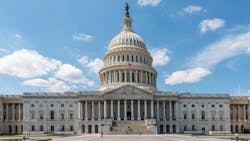House releases its version of stimulus bill as transit agencies join forces to raise call to be included
The U.S. House of Representatives released its version of the third coronavirus stimulus bill Monday. The Take Responsibility for Workers and Families Act, H.R. 6379, would provide $25 billion in grants to the transit industry, as well as more than $1 billion for Amtrak.
The transit funding would be administered through the Federal Transit Administration using Fiscal Year 2020 formulas and could be used by agencies for operating expenses. The bill states the funds should be distributed no later than seven days following enactment of the bill.
Additionally, the bill would allow agencies to use the funds to make payments to furloughed workers and maintains key worker protections, eliminates requirements that transit agencies “match” federal funds and allows agencies to use federal funds to compensate for lost revenues.
The $1.018 billion for Amtrak includes $492 million in grants for the Northeast Corridor.
A revised version of the Senate’s third stimulus package included $20 billion for transit agencies, including $4 billion for rural formula grants and $16 billion in urbanized area formula grants, according to an analysis by EnoTrans Senior Fellow Jeff Davis.
American Public Transportation Association (APTA) President and CEO Paul P. Skoutelas issued a statement expressing appreciation to Congressional leaders for including “desperately needed funds for essential public transportation services” in both versions of the stimulus bills. Skoutelas also urged legislators to approve the highest possible funding level and distribute the funds as quickly as possible.
“Public transportation agencies are taking extraordinary measures and have already been massively impacted. As every day passes, the financial consequences are worsening and more dire. Without these funds, the overwhelming majority of systems will be required to either drastically curtail services or suspend services altogether,” explained Skoutelas.
He noted that funds awarded would support service to help transport many essential workers, as well as provide medical transportation.
“In addition, the industry is seeing dramatic reductions in ridership due to state and local workplace restrictions and is facing billions of dollars of loss in fare revenue as well as in sales tax, and other local taxes and agency revenues, such as parking fees and advertising revenues,” said Skoutelas.
APTA formally requested $16 billion in federal funding late last week for the industry but as ridership and anticipated revenues continue to decline, the needed amount continues to grow.
A group of 10 transit agencies submitted a letter to leadership in the Senate and House reiterating their need for funding and asking that any bill provide at least $25 billion for dedicated support of public transportation.
“The goal of the federal package is to stabilize the economy and establish a back stop that will propel the country forward. Public transit agencies are literally on the frontlines of that effort: We are helping the heroes most critical in this time of crisis – healthcare professionals, first responders and grocery, utility and childcare workers – do their job. It’s a responsibility we take seriously – no matter the cost,” wrote the group of agencies. “Now is the time for the federal government to match that commitment.”
The group called the current situation of declining revenues and added expenses a looming financial catastrophe.
“The collective losses, which early projections show are expected to be in the tens of billions of dollars, can never be recouped and have a compounding impact on our ability to borrow.
“Congressional proposals, while appreciated, thus far are stop-gap measures. Public transit agencies are taking action to address the financial crisis we are all facing. Scaling back service isn’t enough to keep our operating budgets in the black. And allowing critical state-of-good repair investments we’ve fought long and hard for to be gutted in favor of operational costs is a non-starter. We need comprehensive, permanent solutions that put public transportation first,” the group wrote.
About the Author

Mischa Wanek-Libman
Group Editorial Director
Mischa Wanek-Libman is director of communications with Transdev North America. She has more than 20 years of experience working in the transportation industry covering construction projects, engineering challenges, transit and rail operations and best practices.
Wanek-Libman has held top editorial positions at freight rail and public transportation business-to-business publications including as editor-in-chief and editorial director of Mass Transit from 2018-2024. She has been recognized for editorial excellence through her individual work, as well as for collaborative content.
She is an active member of the American Public Transportation Association's Marketing and Communications Committee and served 14 years as a Board Observer on the National Railroad Construction and Maintenance Association (NRC) Board of Directors.
She is a graduate of Drake University in Des Moines, Iowa, where she earned a Bachelor of Arts degree in Journalism and Mass Communication.
